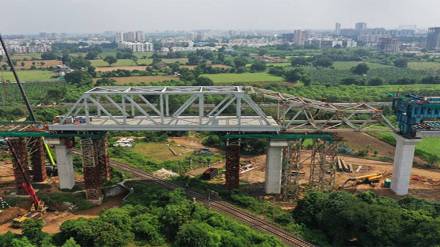The National High-Speed Rail Corporation (NHSRC), under the ‘Make in India’ initiative has successfully finished the construction of a 60-meter-long steel rail bridge in Vadodara. The bridge is one of the major parts of the Mumbai-Ahmedabad High-Speed Rail (MAHSR) corridor and has been erected on the Bajwa-Chhayari line of Western Railways. The completion of the bridge was achieved on 22 October and marks a major milestone in the progress of India’s first bullet train project. After the project is completed, commuters will be able to travel from Mumbai to Ahmedabad in just two hours and the train will run at a speed of 320 kilometers per hour.
This is the fifth bridge among 28 planned steel bridges
This is the fifth bridge that has been constructed out of 28 planned steel bridges for the MAHSR corridor. The bridge’s weight is about 645 metric tonnes and is 12.5 meters in height and has a width of 14.7 meters. The raw materials of the bridge have been manufactured in Bhachau city of Kachchh district of Gujarat. The bridge was later transported to Vadodara for installation and assembly. The bridge is designed in a way that it is expected to have a lifespan of 100 years. The bridge has been assembled by using 25,659 Tor-Shear Type High Strength (TTHS) bolts and is equipped with elastomeric bearings and C5 system painting.
Installation of the bridge
The bridge was initially built on a temporary structure on the ground and after that, it was lifted to its final height of 23.5 meters with the help of two semi-automatic jacks which each had a capacity of 250 tonnes. The bridge was lifted by utilizing MAC-alloy bar’s advanced engineering techniques.
Boost to local manufacturing
The Mumbai-Ahmedabad High-Speed Rail project has been made by using Indian technology and by Japanese technical expertise. The NHSRC highlighted that two major factors have been given utmost importance, one is safety standards and the other is maintaining high-level of engineering perfection. Under the ‘Made in India’ initiative, the project also plans to enhance infrastructure development and encourage local manufacturing.
Once the project is completed, a total of 35 trains are expected to run a total of 35 trains daily. The trains will be available every 20 minutes during peak hours and for 30 minutes if it is during non-peak hours. The control room for this corridor will be managed entirely in Sabarmati.
(With inputs from ANI)
